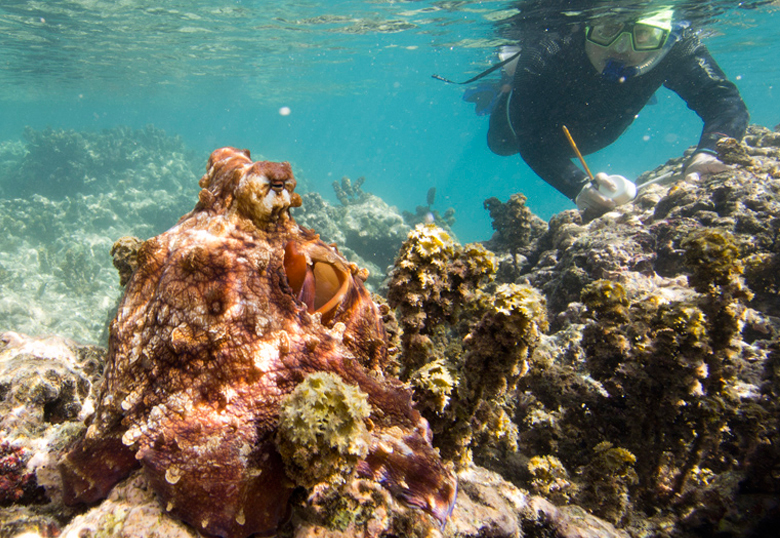Growing up in Victoria, B.C., Dr. Jennifer Mather loved exploring the seashore. Rather than being drawn to larger animals like seals and whales, Mather was curious about much smaller life forms.
“It was just fascinating,” she says. “I was looking at snails, hermit crabs, sea anemones and I was turning over rocks to see the crabs underneath and collecting shells.”
Her captivation was so great she decided at the tender age of 10 that she wanted her life’s work to include the study of marine animals. To become the renowned octopus expert that she is today, Mather studied the habits of these intelligent masters of camouflage with eight tentacled legs and three hearts in aquariums and places like Hawaii and the Caribbean island of Bonaire.

“We feel privileged to have had Sy write about us. Sy is a wonderful person to be anywhere with; she’s curious, social and interested in everything. She was excited by the possibilities. It was great fun,” says Mather. “The idea of the book is to try to explain how field researchers get into field research and how they work.”
Mather, who teaches in the U of L’s Department of Psychology in landlocked Lethbridge, spent nearly a month in Moorea studying octopuses. She, along with Dr. David Scheel, a marine biology professor from Alaska Pacific University, Dr. Tatiana Leite, a professor of marine ecology at Brazil’s University of Rio Grande do Norte and a former student of Mather’s, and Keely Langford, an interpretive specialist at the Vancouver Aquarium, undertook the field study to see if they could determine whether personality or prey availability play a role in what an octopus eats.
During a previous expedition to Hawaii, Mather found octopuses that ate only crab. Other studies done in various locations have shown that some octopuses eat a varied diet while yet other populations eat snails only. In Moorea, she hoped to gather more data to get closer to answering the question.
The Octopus Scientists describes the kind of work scientists do on a daily basis, from donning wetsuits and snorkeling as they searched for octopuses to administering personality tests and recording the octopuses’ responses to being approached and gently touched with a pencil. Scientists then collect the prey remains found near the den for sorting and identification.
“To figure out what an octopus eats you find its home and then you find its garbage heap,” says Mather. “They eat the soft part of the food and throw out the hard parts.”
During their time in Moorea, the team found 18 octopuses at five sites and collected, sorted and identified 244 shells and carapaces from the octopuses’ garbage heaps. At the end of the study, Mather was unable to determine if personality played a role in the diet of an octopus. For now, it seems habitat is more important than personality.
“I don’t know, but as a scientist I have to pursue all sorts of little alleys and say ‘maybe this’ and ‘maybe that,’” she says.
The decision that Mather made when she was 10 has given her a career that’s incredibly diverse. She has provided advice on regulations concerning the ethical treatment of animals and is the go-to octopus expert for PETA (People for the Ethical Treatment of Animals). In addition, Mather is passionate about good teaching and she often writes on that subject, too.
“So being an octopus expert leads me in a bunch of different directions,” says Mather. “That’s exactly why Sy writes this series of books — to show people the fascination of science and the scope.”
